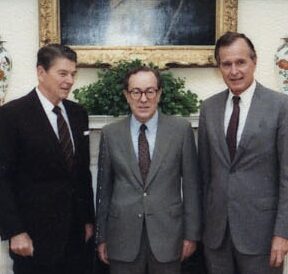
James Goodby
Overview
* Former U.S. ambassador to Finland
* Senior research fellow at MIT
* Advocates a 90 percent reduction in America’s nuclear weaponry arsenal
* Characterizes U.S. as “a nation motivated by fear and ready to lash out at any country it defines as the source of a gathering threat.”
The U.S. ambassador to Finland and the chief negotiator for cooperative threat reduction during the Clinton administration, James Goodby is currently affiliated with the Brookings Institution and the Massachusetts Institute of Technology, where he is a senior research fellow. He has been a professor at several universities, including Carnegie Mellon, Georgetown, and Stanford. His 2002 work A Strategy for a Stable Peace begins with the utopian delusion, “The United States, Russia, and all the nations of Europe could eliminate war as a means of settling disputes among themselves. It will not be easy but it is within their reach.” To achieve this goal, he advised the United States to cut its active nuclear weapons inventory by ninety percent.
This boundless confidence in the kindness of strangers is omnipresent in Gooby’s thinking. The lesson he learned from the 9/11 terrorist attacks was that the U.S. should not take unilateral military action anywhere in the world, but rather should try to recruit help from the French and others. “The attacks in New York and Washington have shown that isolationism and unilateralism are no longer viable options for the United States,” he writes. Immediately after 9/11, he advised President Bush to conciliate with the Chinese, asking them to make “broader efforts to combat the spread of weapons of mass destruction” – an unusual call for China, the world’s chief proliferator of nuclear weapons and long-range missiles to rogue regimes. In making this overture, Goodby writes, “Mr. Bush will have to correct the implications of what his administration has done to portray China as the successor to the Soviet Union,” which is “exaggerated and unproductive.”
As friction over Operation Iraqi Freedom exposed the considerable chinks in Goodby’s U.S.-Russia-European Union troika, he insisted that the answer to Saddam Hussein’s “decade of defiance” was “Ike-Like Diplomacy Instead of War.” In truth, however, Ike [President Eisenhower] specialized in “brinksmanship,” threatening to launch a full-scale nuclear attack to force a peace treaty during the Korean Conflict, and again if the Communists continued to threaten the islands of Quemoy and Matsu. But this is not the diplomacy Goodby had in mind. He accused President George W. Bush of creating a Fortress Amerika. In a Financial Times article, Goodby wrote that under President Bush, “Fear has been used as a basis for curtailing freedom of expression and for questioning legal rights long taken for granted.” “Ronald Reagan’s favorite image,” Goodby added, “ . . . of America as ‘a shining city on a hill’ has been unnecessarily dimmed by another image: a nation motivated by fear and ready to lash out at any country it defines as the source of a gathering threat.”
Goodby authored the 1998 book Europe Undivided: The New Logic of Peace in U.S.-Russian Relations. He also edited the following books: The Limited Partnership: Building a Russian-U.S. Security Community (1993); Transforming Nuclear Deterrence (1995); Regional Conflicts: The Challenge to U.S.-Russian Cooperation (1995); and Northern Territories and Beyond: Russian, Japanese, and American Perspectives (1995).
Much of this profile is adapted from 57 Varieties of Radical Causes, published by Ben Johnson in September 2004.